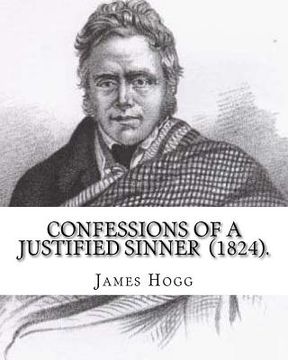Confessions of A Justified Sinner (1824). By: James Hogg: ( Written by Himself ).Psychological mystery, philosophical novel, satire (en Inglés)
Reseña del libro "Confessions of A Justified Sinner (1824). By: James Hogg: ( Written by Himself ).Psychological mystery, philosophical novel, satire (en Inglés)"
The Private Memoirs and Confessions of a Justified Sinner: Written by Himself: With a detail of curious traditionary facts and other evidence by the editor is a novel by the Scottish author James Hogg, published anonymously in 1824. Considered by turns part-gothic novel, part-psychological mystery, part-metafiction, part-satire, part-case study of totalitarian thought, it can also be thought of as an early example of modern crime fiction in which the story is told, for the most part, from the point of view of its criminal anti-hero. The action of the novel is located in a historically definable Scotland with accurately observed settings, and simultaneously implies a pseudo-Christian world of angels, devils, and demonic possession. The first edition sold very poorly and the novel suffered from a period of critical neglect, especially in the nineteenth century. However, since the latter part of the twentieth century it has won greater critical interest and attention. It was praised by André Gide in an introduction to the 1947 reissue and described by the critic Walter Allen as 'the most convincing representation of the power of evil in our literature'.It has also been seen as a study of religious fanaticism through its deeply critical portrait of the Calvinist concept of predestination. It is written in English, with some sections of Scots that appear in dialogue. Plot Many of the events of the novel are narrated twice; first by the 'editor', who gives his account of the facts as he understands them to be, and then in the words of the 'sinner' himself. The 'Editor's Narrative' starts in 1687 with the marriage of Rabina Orde to the much older George Colwan, Laird of Dalcastle. Rabina despises her new husband because he falls short of her extreme religious beliefs, his love of dancing and penchant for drinking alcohol. She initially flees him but her father forces her back, and they live separately in the one house. Rabina gives birth to two sons. The first, George, is indisputably the son of the Laird, but it is strongly implied - though never confirmed - that her second son, Robert, was fathered by the Reverend Wringhim, Rabina's spiritual adviser and close confidante. George, raised by the Laird, becomes a popular young man who enjoys sport and the company of his friends. Robert, educated by his mother and adoptive father Wringhim, is brought up to follow Wringhim's radical antinomian sect of Calvinism, which holds that only certain elect people are predestined to be saved by God. These chosen few will have a heavenly reward regardless of how their lives are lived. The two brothers meet, as young men, in Edinburgh where Robert starts following George through the town, mocking and provoking him and disrupting his life. He appears to have the ability of appearing wherever George is. When on a hill-top, George sees a vision of his brother in the sky and turns to find him behind him, preparing to throw him off a cliff. Robert rejects any friendly or placatory advances from his brother.... James Hogg (1770 - 21 November 1835) was a Scottish poet, novelist and essayist who wrote in both Scots and English. As a young man he worked as a shepherd and farmhand, and was largely self-educated through reading. He was a friend of many of the great writers of his day, including Sir Walter Scott, of whom he later wrote an unauthorized biography. He became widely known as the "Ettrick Shepherd", a nickname under which some of his works were published, and the character name he was given in the widely read series Noctes Ambrosianae, published in Blackwood's Magazine. He is best known today for his novel The Private Memoirs and Confessions of a Justified Sinner. His other works include the long poem The Queen's Wake (1813), his collection of songs Jacobite Reliques (1819), and his two novels The Three Perils of Man (1822), and The Three Perils of Woman (1823).

